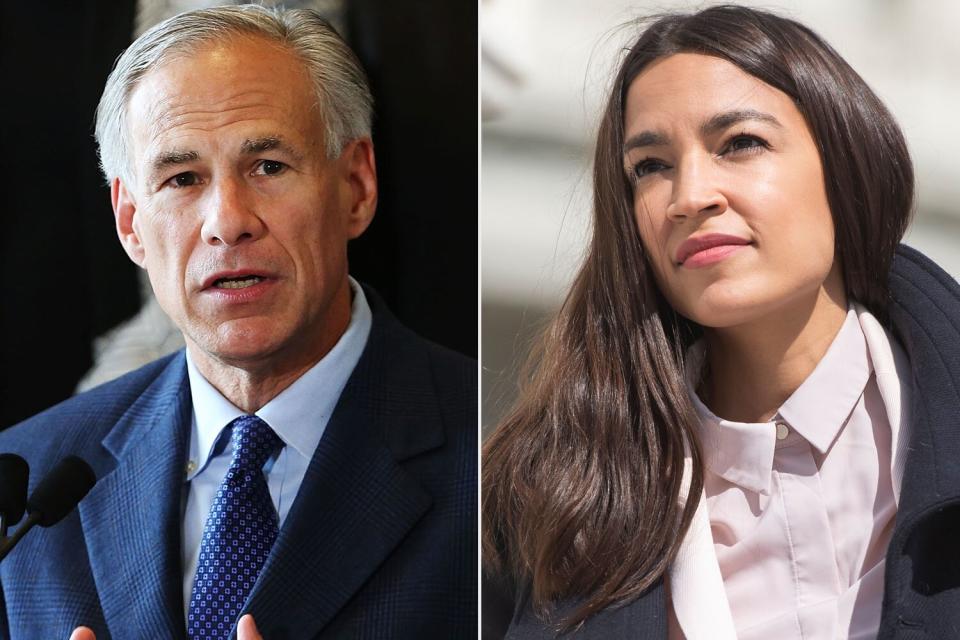Alexandria Ocasio-Cortez Criticizes Texas Gov. Greg Abbott for His 'Deep Ignorance' on Abortions

Spencer Platt/Getty; Tom Williams/CQ-Roll Call, Inc via Getty Gov. Greg Abbott and Rep. Alexandria Ocasio-Cortez
Rep. Alexandria Ocasio-Cortez criticized Texas Gov. Greg Abbott on Tuesday for his "deep ignorance" on abortions after the republican defended his state's controversial ban on the procedure after six weeks of pregnancy.
Speaking to CNN's Anderson Cooper, New York democrat Ocasio-Cortez said that Abbott "speaks from such a place of deep ignorance … and it's not just ignorance, it's ignorance that's hurting people across this country."
Earlier that day, Abbott had spoken in support of his state's new law, which bans abortions after six weeks of pregnancy, before many people are aware they are pregnant, and provides no exceptions for rape or incest.
RELATED: Highly Restrictive Texas Law Now Bans Abortions Before Many Women Know They're Pregnant
Asked by a reporter why he would "force a rape or incest survivor to carry a pregnancy to term," Abbott claimed that the law "doesn't require that at all because, obviously, it provides at least six weeks for a person to be able to get an abortion."
Ocasio-Cortez said his comments were "disgusting" and that "I do know that he is not familiar with a female or menstruating person's body because if he [was], he would know you don't have six weeks."
"In case no one has informed him before in his life, six weeks pregnant means two weeks late on your period," she continued. "And two weeks late on your period, for any person with a menstrual cycle, can happen if you're stressed, if your diet changes, or for really no reason at all. So you don't have six weeks."
Abbott had also promised that he could end rapes in the state, saying that "rape is a crime and Texas will work tirelessly to make sure that we eliminate all rapists from the streets of Texas by aggressively going out and arresting them and prosecuting them and getting off the streets."
Ocasio-Cortez, who shared in February that she is a survivor of sexual assault, pointed out that rapists "aren't just predators that are walking around the streets at night."
"They are people's uncles, they are teachers, they are family friends, and when something like that happens, it takes a very long time, first of all, for any victim to come forward. And second of all, when a victim comes forward, they don't necessarily want to bring their case into the carceral system. They don't want to re-traumatize themselves by going to court. They don't necessarily all want to report a family friend to a police precinct, let alone in the immediate aftermath of the trauma of a sexual assault," she said.
RELATED VIDEO: 'I Pray for All ... Who Will Suffer': Many Stars Are Outraged at Sweeping Alabama Abortion Ban
The Texas Department of Safety reported more than 14,000 cases of rape in a 2019 study, according to the Austin American-Statesman. In contrast, 2,200 people were arrested for rape that year. According to a 2015 study from the University of Texas' Institute on Domestic Violence, more than a third of Texans have experienced sexual assault in their lifetime and more than 90% of assaults go unreported.
RELATED: 27 Celebrities Who Have Shared Their Abortion Stories to Help Women Feel Less Alone
Ocasio-Cortez spoke further on Texas' abortion ban in a series of tweets.
"Sexual assault is an abuse of power that attempts to seize sexual control over another person's body. Anti-choice laws are also an abuse of power that attempts to seize sexual control over people's bodies en masse," she said. "And that's 1 way rape culture informs anti-choice legislation."
On Monday, Attorney General Merrick Garland said that the Justice Department is looking at "all options" to remove the law and will work to help abortion clinics in the state that are "under attack." The conservative-leaning Supreme Court is expected to look at the law and whether it and other similar abortion bans in additional states are in violation of the precedents established with Roe v. Wade.

